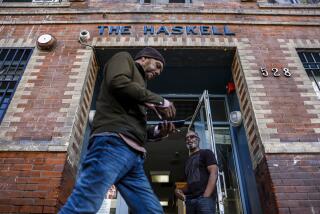The Inn Crowd: More Long-Term Housing Downtown
- Share via
For more than 70 years, San Diego’s stock of residential hotel rooms has been steadily depleted as old hotels were demolished for new office buildings or were converted to more-profitable uses.
But in a reversal of that trend, ground will be broken today for the Baltic Inn, a $3.9-million residential hotel that will house 207 low-income people.
When it opens in the spring, the hotel will help fill what San Diego’s Housing Commission believes to be an urgent need in the city’s downtown housing market, which has not seen a new “single room occupancy” hotel in 73 years. These hotels, or SROs, are hotels that generally do not house tourists. The rooms often are long-term residences for one person, but they usually lack kitchens or private baths.
“With all the downtown redevelopment in the last few years, there have been thousands of jobs created for bus boys, sales clerks, construction people and other low-wage types who need affordable housing,” said Ben Montijo, the Housing Commission’s executive director. “But during that same time, the city has lost more than 1,000 SRO units, so there’s a real crunch.”
Today, there are only 3,500 such units in 65 hotels to fulfill a demand that the commission puts at 5,000 units, Montijo said.
“The hotel managers have told us that they don’t even bother to keep waiting lists--there’s so much demand that they can fill a room the day someone leaves.”
The Baltic Inn, which will be at 521 6th Ave. just south of Martin Luther King Way, will rent 20% of its rooms to low-income persons for $200 per month--a stipulation attached to the $500,000 low-interest loan provided by the Housing Commission. The remaining rooms will be let at $275 per month.
Single room occupancy housing ranges from less than $200 a month to more than $400 a month, with the average being $234 downtown, Montijo said.
Officials for the BMW Partnership, a private group building the hotel, believe that most of the rooms will be filled with working-class tenants and retirees.
“There’s a big misconception that people have about SROs--that they’re filled with transients and down-and-outers,” BMW partner Bud Fischer said.
“The fact is that we’ve been adding a whole bunch of jobs downtown that are in the $4- to $8-an-hour range, and this is the most effective way to see that those people find housing.”
According to a survey conducted by the commission nine months ago, only 28% of those living in San Diego’s single room occupancy hotels are employed. But many of those who are not employed may be receiving a pension or Social Security, Montijo said.
Although the Baltic will be the city’s first new SRO to be built since 1913, Fischer says he has no hesitations about bucking the development tide.
“If all the information that we’ve been provided by the city is correct, then this is going to be a very successful project,” Fischer said. “And if this works out, we’ll build another.”
Fischer said the group, which includes Chris Mortenson and Ken Winslow, became interested in the SRO shortage a year and a half ago when they purchased another building, the Star Hotel on 7th Avenue, which had a 43-room SRO on one floor.
“We considered a whole range of uses for it and finally decided to rehabilitate it and leave it as an SRO, and so far it has been quite a good investment for us,” Fischer said. “We kept hearing that there was a shortage of SRO housing, so we decided to look into building another one.”
Fischer said he and other members of the BMW partnership have been involved in renovation projects in the Gas Lamp District and “enjoy being on the cutting edge of things.”
The four-story structure will be a frame-and-stucco construction, and each of the 10-by-12-foot rooms will come furnished and will have a toilet and a wash basin.
“This isn’t going to be the sort of run-down place that most people associate with SROs,” Fischer said.
For the Housing Commission, the project is seen as a vindication of its strategy of using private investment to increase the housing stock.
“Our philosophy all along has been to give financial incentives, like low-interest loans, to get private money and management in there instead of subsidizing such housing with the taxpayers’ money,” Montijo said. “What we hope is that this will convince more private groups to get involved.”
But Hans Jovishoff, of the Housing Coalition of Greater San Diego, said his consumer-oriented group believes that the commission has been too timid in its steps to alleviate the housing shortage.
“As it stands, only 20% of these rooms are going to be truly affordable. We’d like to see the commission spend some money to increase that number,” he said.
Because of the high demand for such housing, Montijo said, the commission does not expect the rents to be driven down by new construction.
“Although the cost may seem high, I think the owners are charging what they have to to stay in business, given the cost of real estate here.”
More to Read
Inside the business of entertainment
The Wide Shot brings you news, analysis and insights on everything from streaming wars to production — and what it all means for the future.
You may occasionally receive promotional content from the Los Angeles Times.










